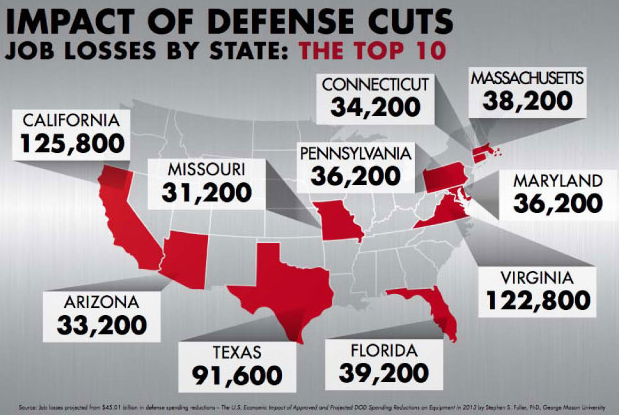
Defense-industry chart predicting the lost jobs if military spending is cut by $1 trillion over next 10 years / AIA
Paper cuts are becoming an occupational hazard of covering the debate over how to trim Pentagon spending. If you feel like getting slashed with competing reports, a pair of studies released Tuesday should send you running for bandages.
Bottom line: we can cut spending if we defend less. But if we defend less, we’re going to lose a lot of jobs.
The liberal — heck, it’s based in Cambridge, Mass. — Project on Defense Alternatives’ Carl Conetta released a study calling on the U.S. to recalibrate — trim — its mission-set to enable the Pentagon to defend the nation more cheaply:
The sharp rise in the Pentagon’s base budget since 1998 (46% in real terms) is substantially due to strategic choice, not security requirements, per se. It reflects a refusal to set priorities as well as a move away from the traditional goals of military deterrence, containment, and defense to more ambitious ends: threat prevention, command of the commons, and the transformation of the global security environment. The geographic scope of routine US military activity also has expanded.
But an hour later, the Aerospace Industries Association, representing major defense contractors who build things that fly, released a report decrying the job losses such cuts would mean:
An economic impact analysis projects more than one million American jobs could be lost as a result of defense budget cuts if the deficit reduction select committee fails to reach agreement on alternative balanced budget solutions and total cuts to defense reach $1 trillion. Dr. Stephen S. Fuller, Dwight Schar Faculty Chair, University Professor and Director, Center for Regional Analysis at George Mason University and Economic Modeling Specialists Inc. (EMSI) conducted the analysis on behalf of the Aerospace Industries Association. “Our analysis reveals bleak outcomes for both the defense industry and the economy as a whole if the budget sequestration trigger is pulled and $1 trillion is cut from defense,” said Dr. Fuller.
There is real concern in the defense community that the so-called congressional super committee isn’t going to be able to propose sufficient cuts and tax hikes next month to pare the deficit by the required $1.2 trillion over the coming decade. That’s why its players increasingly are emphasizing jobs over defense. In these lean times, it seems, people are more afraid of losing their current job than losing the next war.


